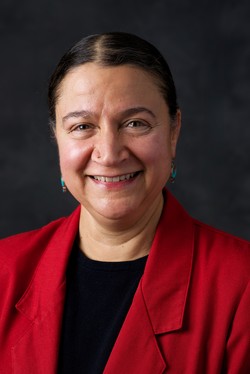“Our sisterhood isn’t so much about biology, as it is about the closeness and the sense of care that we have for one another as Native Americans and sisters in our faith.”
Elona Street-Stewart, executive of the Synod of Lakes & Prairies, delivered the keynote address during the Native American Presbyterian Women’s Conference in Minneapolis, Minn., June 18. Her message to attendees focused on the concept of kindom, and the importance of understanding and embracing richness of the Native American sisterhood in the kindom of God, and the ways in which these deep ties can help make an impact across the church and throughout communities.
“There are kinship relations that sometimes—and often unbeknownst to us—supersede, the basic logic that we have about who we are, but they are also so instrumental to our identities,” said Street-Stewart. “We are surrounded by and immersed in layers and layers of relationships. We embed our values and our traditions into the descriptions of people that we’re related to and bit by bit we are interpreting the value of that relationship.”
She added, “In order to increase the ways we strengthen our communities and our cultural connections through these relationships, we have to increase our awareness that it is a process, that it is developmental and that it requires attention to these relationships over time.”
“At the center of many of our beliefs as Native Americans, we believe that we are all related.”
With that, Street-Steward noted that it is critical that all children—in the church and throughout each individual’s community—are aware of and have access to resources that meet their individual and community needs, including programs that promote better education, increase access to healthy foods and the development of better eating habits, that work eradicate violence against women and children, among many others. She asked participants, “What ideas do you have for the children in your community? Where do you see the greatest needs? Think about how we—are a sisterhood, as a kindom—can help.”
Building on the biblical reference of Mark 1: 29–31, Street-Stewart asked conference attendees how their individual and collective work relates to the kindom, and encouraged the women to consider three questions:
- Why do we do the work that we do, and why have we gathered here today?
- What will we do next—in our families, congregations and communities—after we leave here?
- What will we change through our actions?
“Our greatest ability is our availability,” said Street-Stewart. “We must remember that and continue work to make a difference. We have to show up. We have to make our presence in the church and in our communities known. We need to be there to pull one another up, to support one another, for us to continue to make an impact.”
Street-Stewart was installed as the executive of the Synod of Lakes & Prairies in April 2015, becoming the first Native American to serve in that capacity in the Presbyterian Church (U.S.A.) She is a ruling elder and longtime staff member with the synod, having served most recently as the associate for racial ethnic ministries and community empowerment.
In addition to her work with the church, she is an active member of her community, having served on the executive committee of the Minnesota Council of Churches, and with the Saint Paul Area Council of Churches’ Department of Indian Work. In 2001, she also became the first Native American elected to the board of an urban school district in Minnesota. During her tenure, she has served as chairperson of the boars, as a district director on the Minnesota School Boards Association, with the Council of the Great City Schools and on the National School Board Associations Council on Urban Boards of Education.

